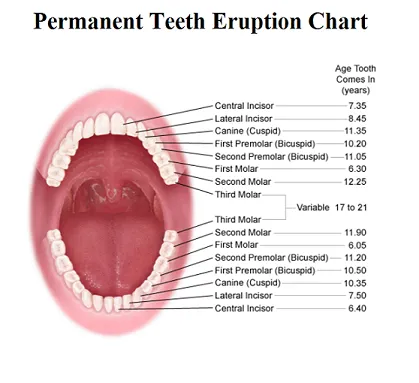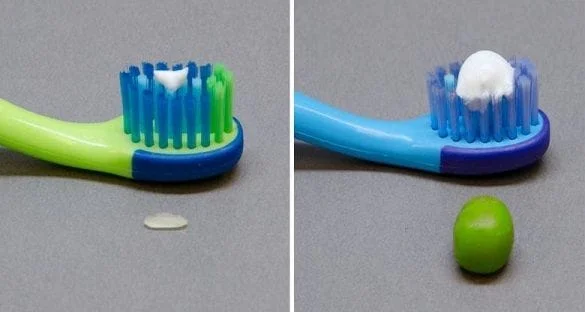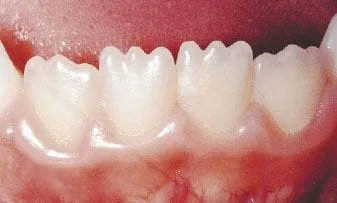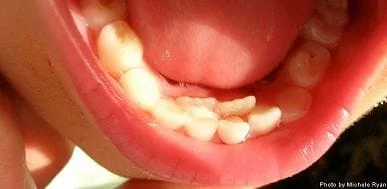- What is a pediatric dentist?
- Why are baby teeth important?
- When is my child going to get / lose their teeth?
- Is it safe to use fluoride toothpaste?
- Why are my child's adult teeth coming in so yellow?
- What if my child's adult teeth are growing in behind their baby teeth?
- My child grinds their teeth at night - what do I do?
- Does my child need braces?
- What do I do about my child's bad breath?
What is a pediatric dentist?
A pediatric dentist has an extra two to three years of specialized training after dental school dedicated solely to the protection of oral health for children from infancy through the teenage years. Very young, pre-teen, and teenage patients often need different approaches in gaining their cooperation, guiding their dental growth and development, and helping them avoid future dental problems. A pediatric dentist is best qualified to meet these needs.
Why are baby teeth important? Aren't they just going to fall out?
Neglected cavities can and frequently do lead to pain, infection, and problems that affect the developing permanent teeth. Primary teeth, or baby teeth, are important for (1) proper chewing and eating, (2) providing space for the permanent teeth and guiding them into the correct position, and (3) permitting normal development of the jaw bones and muscles. While the front 4 teeth last until 6-7 years of age, the back teeth (cuspids and molars) aren't replaced until age 10-13. Maintaining the health of the primary teeth creates an oral environment where a healthy adult smile can develop.
When is my child going to get / lose their teeth?
Children's teeth begin forming before birth. As early as 4 months, the first primary (or baby) teeth to erupt through the gums are the lower central incisors, followed closely by the upper central incisors. Although all 20 primary teeth usually appear by age 3, the pace and order of their eruption varies from child to child.
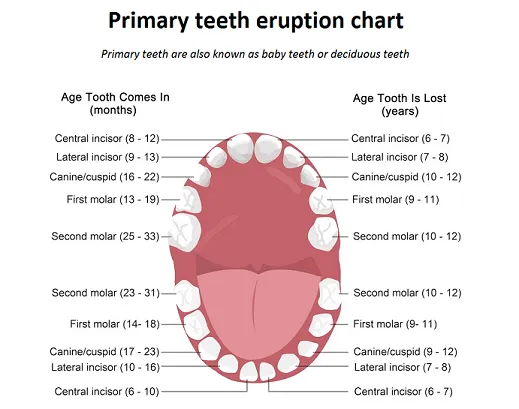
Permanent teeth begin appearing around age 6 - starting with the first molars and lower central incisors. This process continues until approximately age 17 - 21. Adults usually have 32 permanent teeth including 4 wisdom teeth.
Is it safe to use fluoride toothpaste?
The fact of the matter is fluoride is safe and extremely effective at preventing decay when used properly. Like any other medicine, if used improperly or at the incorrect dose - there can be side effects. The problem is that most people think of toothpaste like a soap or shampoo where the amount used isn't regulated. When combined with other dietary sources of fluoride, ingestion of too much fluoride from toothpaste or fluoride supplements by preschool-aged children can lead to dental fluorosis. Fluorosis is a discoloration of the permanent teeth ranging from chalky white to brown.
Just like every other medicine in the house, (1) it should be kept out of reach of small children, and (2) Mom or Dad always ensures the appropriate dose is being used. The American Academy of Pediatric Dentistry recommends the twice daily use of a "rice-size" or "smear" of fluoridated toothpaste as soon as the baby teeth emerge for children under the age of three, increasing to a "pea-size" amount for children aged three to six.
Why are my child's new adult teeth so yellow?
No worries - this is totally normal. The baby teeth are often called "milk teeth" because they are extremely white. Healthy adult teeth are a very light yellow due to their different internal structure - they have a thicker layer of a substance called dentin underneath the enamel. When the first adult teeth emerge right next to baby teeth the contrast can make them appear darker. This illusion disappears as the adult smile continues to develop.
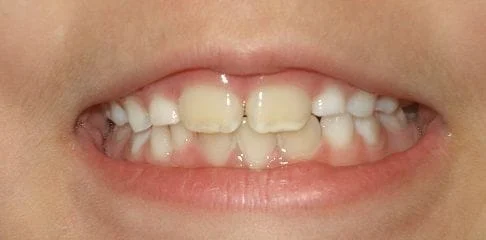
Oh and those little bumps on the cutting edges of their front teeth? Those are developmental ridges called mamelons that are present when the incisors first erupt through the gums. They wear away quickly with use.
Why does my child have two rows of teeth?
Adult teeth often erupt at angles that fail to resorb the roots of the baby teeth, causing them to linger in the mouth. Most of the time the baby tooth will eventually fall out on it's own, but sometimes we may need to help by removing it so the adult tooth can grow into its correct position.
My child grinds their teeth - should I be concerned?
Roughly half of children grind their teeth at night and the vast majority spontaneously outgrow this habit as more of the adult teeth begin to emerge in the mouth. The baby teeth are far more capable of absorbing this type of abuse without causing effects on the health of the jaw joints (TMJ). If grinding continues into adolescence, an occlusal guard may be required to protect the adult teeth and joint. It is exceedingly rare that the baby teeth require treatment due to extreme wear and loss of tooth structure.
Why are my child's new adult teeth so crowded in the front?
A kid can have a "Hollywood" smile with perfectly straight baby teeth and no gaps at age five - but then think about it - where are those much larger front adult teeth going to go? It's very common to have some degree of crowding and overlap when the adult teeth start to emerge but don't worry, most kids don't need braces until all of their adult teeth come in around age 12-13. There are some exceptions though - that's why the American Association of Orthodontists recommends children see an orthodontist by age 7 if a problem is identified. At each visit we'll be sure to check if your child may benefit from early treatment in order to keep things from being unnecessarily complicated later on.
What can I do about my child's bad breath?
Look, it can be really hard to optimize hygiene with young kids. That's why Dr. David recommends that parents continue to assist with toothbrushing until their children are able to write cursive. Help with flossing? Even later. If you haven't done it before - trying using a tongue scraper (or the edge of a teaspoon):
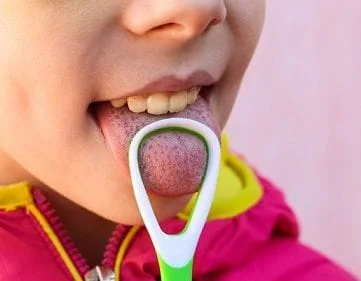
You would be amazed by the amount of food debris that can hide in the furrows of your tongue! However, most often bad breath originates further down the digestive tract and is often contributed to by sinus-related issues.
